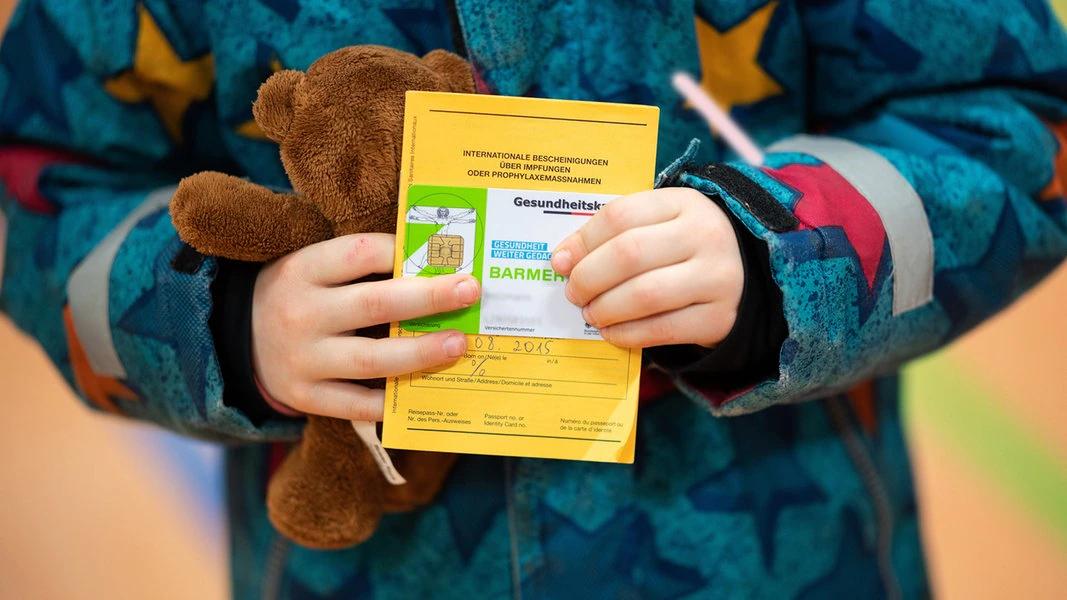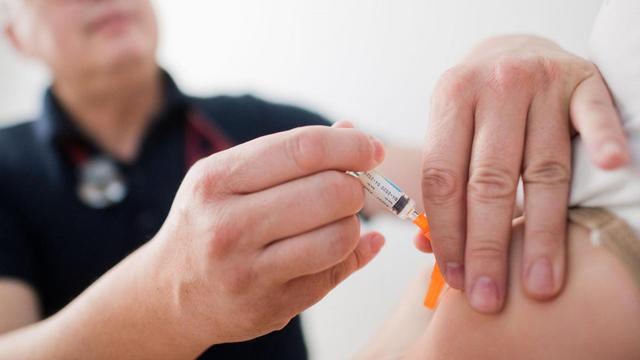Your five-year-old daughter must be vaccinated before she gets Covid-19. And the probability that she will become infected is currently increasing massively, says a 40-year-old mother, who has been trying for a long time to get her child vaccinated - so far in vain. Her husband and she have been vaccinated three times because they take Corona very seriously. Even if the risk of her daughter becoming seriously ill is low, "you keep hearing about cases in which children also have to go to the intensive care unit and I definitely want to prevent that". But there is a second important reason for the mother: she has noticed that her daughter is suffering from all the restrictions mentally.
The European Medicines Agency (EMA) has also approved the vaccine from Biontech/Pfizer for five to eleven year olds. However, there is still no recommendation from the Standing Vaccination Commission (Stiko). She is expected in the next few days. Professor Michael Frühwald, Director of the Clinic for Pediatrics and Adolescent Medicine at the University Hospital in Augsburg, does not expect a general recommendation. The experienced doctor assumes that the Stiko initially only makes a recommendation for pre-ill children, as was the case for children over twelve.
Omicron can lead to more severe courses in small children
Parents must now decide whether to have their child vaccinated. So would Fruehwald have his five-year-old child vaccinated? "Yes, I would, because lately I've been seeing the damage to the children piling up. And because I found out today that the new type of coronavirus, Omicron, in particular, can lead to more severe acute courses in small children.” "But for that, all adults should have been vaccinated, and unfortunately that didn't happen. The idea of solidarity is shockingly low in our society.”
But many parents are unsure. After all, for many, it makes a difference whether an adult receives a relatively new vaccine or a developing child. So how safe is the vaccine for children, is there even enough data on it? "There is a very good approval study by Pfizer, which included almost 2,500 patients and which showed that the rate of side effects in five to twelve year olds was no higher than in twelve to 16 year olds," explains Frühwald. Inflammation of the heart muscle as a side effect was also observed much less often in the little ones than in the over twelve-year-olds.
Also read

And how does the doctor assess the concern for long-term effects? In his opinion, this fear stems from the fact that many still have not understood how the mRNA vaccine works: "Unfortunately, many people still believe that we are changing the body's blueprint through the mRNA, but that is not the case at all." Injected becomes an mRNA that only passes on important information to the cells, namely the blueprint of the spike protein, which is special for the coronavirus, and is then immediately broken down again. The body can then start developing antibodies. A process that is constantly taking place in the body. "That's why I'm not at all afraid of long-term damage." What the vaccination can trigger acutely are the usual vaccination reactions such as chills, fever and headaches. "Children may have to lie in bed for two or three days after the vaccination, but that usually passes again."
Children and adolescents can also contract Long Covid
Freuhwald is much more worried that more and more young, seriously ill patients are now coming to the clinic in the fourth wave: At the moment, for example, a 17-year-old is lying in the infirmary who has severe pneumonia from an acute Covid infection. Well, she's a bit overweight, but that's a lot of people in puberty. In the room next to her is a 14-year-old who fell ill with Covid three weeks ago and now has cardiac arrhythmias and severe heart muscle inflammation. And two rooms down is a 13-year-old: an athletic boy who got infected two months ago and has had chest pains, memory problems and other typical long-Covid symptoms ever since. “The boy can no longer remember what he has just heard at school. He says of himself: I don't know who I am anymore. I don’t know myself anymore.” And given that children can also contract Long-Covid or the autoimmune syndrome PIMS, Frühwald advocates vaccination.
For him, the imponderable and massive psychological damage should not be underestimated. In his opinion, they are not only due to the lockdown. "Children suffer massively from the lack of prospects, from the divisions and quarrels in families." It is not uncommon for parents to disagree, for example, one is in favor of vaccination, the other against. "All of this makes the children tired and ill." For Frühwald it is clear: "Since we are now allowing all the children to get sick - the incidence in children is sometimes 2000, that's a catastrophe - because we are just let them go, we have to vaccinate the children too.” In this context, the announced compulsory vaccination only for nursing staff, but not for teachers or educators, makes him angry. In his view, compulsory vaccination can only apply to everyone.
And would Frühwald wait for a general Stiko recommendation for children between the ages of five and twelve? "No, I wouldn't."
Augsburg pediatrician warns of the psychosocial consequences of the pandemic for children and young people
Many parents don't do that either. dr Christian Voigt, spokesman for the pediatricians for Augsburg and northern Swabia, vaccinates children from the age of five. He offers so-called "off-label" children's vaccinations, which means that the young patients only receive a third of the dose of the Biontech vaccine for adults. "There's a lot of demand there," he said. Voigt sees no problems at all with the vaccine, but, like Frühwald, regrets that no more adults can be vaccinated. "I'm always appalled at how little trust there is in science, how little trust there is in doctors."
But of course there are also the others, the parents who have been vaccinated themselves and want to protect their offspring as early as possible. There are always two reasons why parents have their children vaccinated: Above all, they want to mitigate the social consequences of this pandemic. In other words, your child should continue to go to kindergarten, to the sports club and be able to meet up with friends. The second reason that comes up again and again is that sick or weak people live in the family household.
Voigt can understand the fear of the social consequences very well: "Because it is a catastrophe for us pediatricians to have to watch the serious psychosocial consequences this pandemic has for children and adolescents." growing up in precarious family circumstances, Voigt is very concerned. Because what he and his colleagues have been registering since the summer: “Some children are gaining massive weight, others continue to lose weight. It is sometimes scary to see how children change within half a year.” The pandemic not only leads to eating disorders, but also to an unhealthy slide into the media world. "Long-term damage is programmed that we will have to deal with for many years to come," warns Voigt.











Test winner at Stiftung Warentest:...
How to get the perfect look for Cos...
Dry elbows: This is how brittle ski...
Cream for Rosacea: The Best Creams